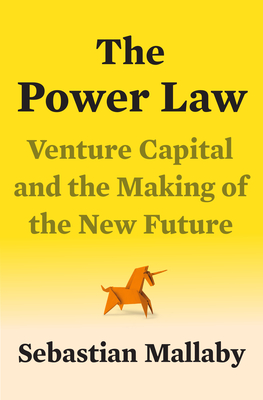

 Penguin Press
Penguin Press
The Power Law: Venture Capital and the Making of the New Future


Key Metrics
- Sebastian Mallaby
- Penguin Press
- Hardcover
- 9780525559993
- -
- 1.25 pounds
- Business & Economics > Industries - Computers & Information Technology
- English
 Secure Transaction
Secure TransactionBook Description
Innovations rarely come from experts. Elon Musk was not an electric car person before he started Tesla. When it comes to improbable innovations, which are the only innovations that really matter, a legendary tech VC told Sebastian Mallaby, the future can't be predicted, it can only be discovered, through iterative venture-backed experiments. It is the nature of the game that most of these experiments will fail, but a very few successes will succeed at such a scale that they will more than make up for everything else. That extreme ratio of success and failure is the power law that drives the VC sector, and all of Silicon Valley, and the wider tech sector shaped in its image. The implications of that power law echo around the world.
In The Power Law, Sebastian Mallaby has parlayed unprecedented access to the most successful venture capitalists of all time - the key figures at Sequoia, Kleiner Perkins, Accel, Benchmark, and Andreessen Horowitz, among others--into a riveting blend of storytelling and analysis that unfurls the whole history of incubating tech companies, in the Valley and ultimately all over the world. We learn the unvarnished truth, often for the first time, about some of the most iconic successes and infamous disasters in Valley history, from the comedy of errors that was the birth of Apple to the avalanche of venture money that fostered hubris at WeWork and Uber. We're taken inside the different strategic models of the storied venture firms, their virtues and drawbacks. We see the impact of culture, within VC partnerships and the companies they nurture--the importance of consciously tending it, and the disasters that ensue when power is concentrated in the wrong hands.
VCs' relentless search for power-law grand slams brews an obsession with the ideal of the lone entrepreneur-genius, and companies seen as potential unicorns are given intoxicating amounts of power, with sometimes disastrous results. On a deeper, more systemic level, the need to make outsized bets on unproven talent reinforces bias that channels money and support to, e.g., a certain kind of white guy from Stanford, with women and minorities still represented, within VCs themselves and the companies they support, at woefully low levels. This doesn't just have social justice implications: China's homegrown VC sector, having learned at the Valley's feet, is exploding, and in short order now has far more women VC heads than America has ever had. Still and all, Silicon Valley VC remains the most successful and influential incubator of business innovation in the world: it is not where ideas come from so much as where they go, to become the products and companies that create the future. Of all the people in the world gambling on the future, this group has made, not just a science of it, but many competing sciences, and The Power Law, by taking us so deeply inside their game, give us the benefit of thinking more keenly about our own future through their eyes.
Author Bio
Sebastian Mallaby is the Paul A. Volcker senior fellow for international economics at the Council on Foreign Relations (CFR). An experienced journalist and public speaker, Mallaby is also a contributing columnist for the Washington Post, where he previously served as a staff columnist and editorial board member. He is the author of The Man Who Knew: The Life & Times of Alan Greenspan, winner of the 2016 Financial Times/McKinsey Business Book of the Year Award and the 2017 George S. Eccles Prize in Economic Writing. His writing has also appeared in the Atlantic and the Financial Times, where he spent two years as a contributing editor.
Mallaby’s interests cover a wide variety of domestic and international issues, including central banks, financial markets, the implications of the rise of newly emerging powers, and the intersection of economics and international relations. His previous book, More Money Than God: Hedge Funds and the Making of a New Elite, was described by New York Times columnist David Brooks as “superb”; it was the recipient of the 2011 Loeb Prize and a New York Times bestseller. His earlier works are The World’s Banker, a portrait of the World Bank under James Wolfensohn that was named as an “Editor’s Choice” by the New York Times; and After Apartheid, which was named by the New York Times as a “Notable Book.” An essay in the Financial Times said of The World’s Banker, “Mallaby’s book may well be the most hilarious depiction of a big organization and its controversial boss since Michael Lewis’s Liar’s Poker.”
Before joining the Washington Post in 1999, Mallaby spent thirteen years with the Economist. While at the Economist, he worked in London, where he wrote about foreign policy and international finance; in Africa, where he covered Nelson Mandela’s release and the collapse of apartheid; and in Japan, where he covered the breakdown of the country’s political and economic consensus. Between 1997 and 1999, Mallaby was the Economist’s Washington bureau chief and wrote the magazine’s weekly Lexington column on American politics and foreign policy. He is a two-time Pulitzer Prize finalist: once for editorials on Darfur and once for a series on economic inequality. In 2015, he helped to found a startup, InFacts.org, a web publication making the fact-based case for Britain to remain in the European Union.
Mallaby was educated at Oxford, graduating in 1986 with a first class degree in modern history. After eighteen years in Washington, DC, he moved to London in 2014, where he lives with his wife, Zanny Minton Beddoes, editor in chief of the Economist.
Source: Council on Foreign Relations
Videos
No Videos
Community reviews
Write a ReviewNo Community reviews